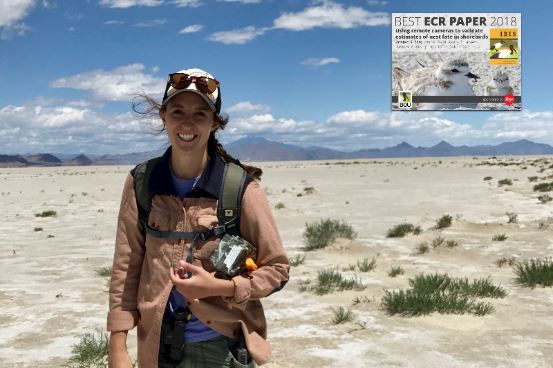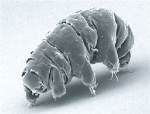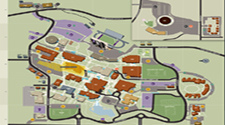Before jumping in to graduate school, make sure you enjoy the research process! I’ve found that most professors are excited to talk about their work and look for ways to get students involved. A great quality of the College of Science at Weber State is the broadness of expertise among faculty, which will help you narrow down the field within your major that interests you most.
What I've Learned About Being a Successful Graduate Student!
April 18, 2019
by Kristen Ellis, Zoology Graduate
Find Kristen on Twitter @kgurrellis

Graduate school can be an intense and rewarding experience, yet incredibly stressful at times. Any given week might include going to class, teaching a class, writing a grant, and collecting data. But something I was taught at Weber State in my Principles of Zoology class has stuck with me throughout my time in graduate school.
Tardigrades, water bears, moss piglets… whatever you’d like to call them, are a group of microscopic animals that live almost everywhere on Earth. One of their best-known features is the ability to survive in spectacularly extreme environments. Even more, researchers have experimentally subjected them to extreme cold, heat, and the ultraviolet radiation of outer space, yet they keep coming out alive.

via Wikimedia Commons
Now that I’m nearing the end of my graduate school experience, I’ve recognized that characteristics of a successful graduate student are not so different from those of the tardigrade, including resilience and the ability to adapt. I often find myself picturing their stubby legs navigating through new environments, and this gives me a bit of inspiration to be more resilient. So, I’ve compiled a few tips below for a successful graduate school experience, that are inspired by the rugged tardigrade.
Make sure you like research
Learn how to learn on your own
Graduate school is very different from getting an undergraduate degree. There is little to no hand-holding, which can be intimidating. In a lot of ways, it’s more like having a job than being a college student (as long as you aren’t failing, no one cares about your GPA anymore). Taking ownership of your education and research project will help you develop into an independent scientist.
Develop thick skin
One of the most important pieces of advice I got when I first started graduate school was to avoid taking criticism personally. Criticism and rejection – a.k.a. “not accepted” – are always present in the life of a scientist and will eventually make you a better writer, public speaker, and researcher.
Take time for self-care
It’s easy to get overwhelmed in graduate school (yes, imposter syndrome is 100% real). Sometimes you will hear peers seemingly brag about how many hours they are putting in. But an insane work schedule is not sustainable, and I’ve found that I’m more productive when I take the time for exercise, eating well, and hobbies.
Graduate school is meant to be hard, but at the same time, it’s exciting! You get to tackle unanswered questions and interact with people that challenge you. And if you start to get stuck in the day-to-day haul of graduate school, be like an indestructible tardigrade and just keep going.
Read Kristen's Winning Research
Office hours
Semesters
Monday - Thursday:
6:30 a.m. - 11 p.m.
Friday: 6:30 a.m. - 10 p.m.
Saturday: 6:30 a.m. - 6 p.m. Sunday: Closed
Holidays & Breaks Hours may vary
Mailing address
Weber State University
College of Science
1415 Edvalson St., Dept. 2501
Ogden, UT 84408-2501
